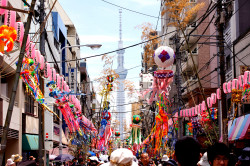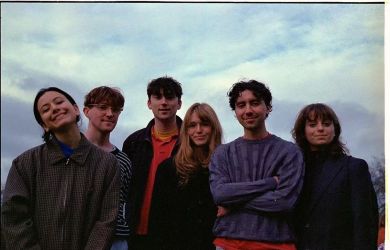
January 6, 2011
Kick Start
From the dancefloor to the sports pitch, 2011 promises to be a year to remember
By Metropolis
Originally published on metropolis.co.jp on January 2011

Film
By Rob Schwartz
Despite Hollywood’s dominance in nearly every other world market, Japanese films have been gaining a greater share of the domestic box office in recent years—they now command over 80 percent of ticket sales here. Expect this trend to continue in 2011.
 January will see the first of two hotly anticipated live-action versions of SF manga Gantz (right). Although it’s a domestic production, an English dubbed version will, unusually, open in the US on January 22, nine days before the Japanese premiere. On the same day, fans of cult director Sono Sion will flock to his super-gory serial killer farce Cold Fish.
January will see the first of two hotly anticipated live-action versions of SF manga Gantz (right). Although it’s a domestic production, an English dubbed version will, unusually, open in the US on January 22, nine days before the Japanese premiere. On the same day, fans of cult director Sono Sion will flock to his super-gory serial killer farce Cold Fish.
This winter will also see the release of the intriguing omnibus comedy Sabi Otoko Sabi Onna. Directors with impressive comic pedigrees like Gen Sekiguchi (Survive Style +5) and Yosuke Fujita (Zen Zen Daijobu) will each take segments in this four-part film.
With spring come a couple of notable Part Twos. SP Kakumei-hen (March 12) is the follow-up to the stylish crime drama SP: The Motion Picture, while Gantz pt. 2 is slated for an April 23 opening—no word yet on the American premiere for that edition.
Another promising comedy will bow in May: Okike no Tanoshii Ryokou: Shinkon Jigoku-hen tells the story of a newly married couple who, already tired of each other, are plunged into a honeymoon trip through hell. That same month will see the debut of the Warner 3D animated blockbuster Tofu Kozo (top), about a miniature ghost who’s depressed because he’s too small and cute to scare people.
Studio Ghibli continues its movement towards younger directors (2010’s Karigurashi no Arietty was made by 37-year-old Hiromasa Yonebayashi), as Hayao Miyazaki’s son Goro takes the helm for the second time with Kokuriko-Zaka Kara. Dad is involved in planning the film and will co-write the script, which concerns a high school girl growing up in Showa-era Japan. Based on the successful manga of the same name, the flick is due out in summer.
Lastly, cinephiles will be eagerly anticipating the 2011 edition of Tokyo Filmex in November, which continues the 2010 edition’s Next Masters series, a lecture/teach-in/competition featuring renowned directors.
Music & Theater
By Dan Grunebaum
Japan continues to wrestle with the double whammy of declining music sales and a shrinking population of youngsters, but in 2011, record companies and promoters will be making heroic efforts to counter these bleak trends.
 The first few months of the year should see some major releases and tours. Beyoncé has reportedly been working on a new album since the summer with Japan favorite Ne-Yo (who’s performing at Yokohama Arena on March 22), so don’t be surprised if she makes her first visit here since headlining at Summer Sonic in 2009. Avril Lavigne’s fourth outing, Goodbye Lullaby, is due out in March with a tour sure to follow, while Katy Perry is confirmed for Studio Coast on May 23-24.
The first few months of the year should see some major releases and tours. Beyoncé has reportedly been working on a new album since the summer with Japan favorite Ne-Yo (who’s performing at Yokohama Arena on March 22), so don’t be surprised if she makes her first visit here since headlining at Summer Sonic in 2009. Avril Lavigne’s fourth outing, Goodbye Lullaby, is due out in March with a tour sure to follow, while Katy Perry is confirmed for Studio Coast on May 23-24.
In the rock scene, both Arctic Monkeys and Radiohead have new discs on the way and could be headed back to Japan this year. The Arctics are rumored to be in the studio with Queens of the Stone Age’s Josh Homme, who produced their last album, Bedbug. Both that record and Radiohead’s—which guitarist Ed O’Brien describes as the “best album we’ve ever made”—are due out this winter on Hostess.
The first Red Hot Chili Peppers LP in five years is apparently already half-finished, with a release penciled in for April or May, and the band is confirmed to headline this year’s Summer Sonic. Acclaimed math-rockers Battles (above right) are working on a follow-up to their 2007 debut, despite the loss of member Tyondai Braxton. You can catch them at SonarSound Tokyo, a three-day bash at Studio Coast on April 1-3 that’s organized by the folks behind popular Spanish electronica fest Sonar.
 In the world of J-pop, Ayumi Hamasaki’s brand new Love Songs is technically a 2010 release but could be one of the biggest albums of 2011. Also look out for new records from Luna Sea, Gackt and Sekima II.
In the world of J-pop, Ayumi Hamasaki’s brand new Love Songs is technically a 2010 release but could be one of the biggest albums of 2011. Also look out for new records from Luna Sea, Gackt and Sekima II.
On the live front, the year gets off to a noisy start with a visit by raucous London band Klaxons, at Akasaka Blitz on January 10, followed by Sting’s more sedate Symphonicity Japan tour at the Nippon Budokan on January 17-19. Scottish wall-of-noisers Mogwai are at Liquidroom on February 2, My Chemical Romance at Yokohama Arena on February 5-6, and febrile post-punks Foals bring their Total Life Forever album to Akasaka Blitz on February 15, with special guests Holy Fuck.
Apocalyptic post-rock act Godspeed You! Black Emperor are back from a seven-year hiatus and headlining Tokyo’s first All Tomorrow’s Parties event on February 27, with a heavyweight if predictable bill of Japanese avant-rock bands like Boredoms and Boris.
Spring begins with a solo show by Elvis Costello (right) at Bunkamura Orchard Hall on March 1, swiftly followed by Belle and Sebastian at Studio Coast and Asian Dub Foundation at Shibuya O-East, both on March 4. Expect a rather older crowd to congregate at Tokyo Dome on March 5-6, when The Eagles will be celebrating their 40th anniversary.
This year will offer Japan its first look at R&B babe Ke$ha (below right), who’s bringing her Get Sleazy Tour to Studio Coast on March 25. Controversy-courting rapper M.I.A. is at the same venue on February 11, while country singer Taylor Swift plays the Budokan on February 16-17.
You can pay your respects to an evergreen pop legend when Kylie Minogue gives her first proper concerts in the country for 20 years. The stage spectacular for the singer’s new album Aphrodite, which she describes as a “euphoric journey of joy, excitement and glamour,” hits Makuhari Messe on April 23-24.
 Speaking of pop icons, The Jacksons—brothers Jackie, Tito, Marlon and Jermaine—will be performing a tribute concert for sibling Michael in Tokyo in October. The event is hosted by Japanese R&B star Ai, who’s going into the studio to lay down some new tracks with the brothers in early 2011.
Speaking of pop icons, The Jacksons—brothers Jackie, Tito, Marlon and Jermaine—will be performing a tribute concert for sibling Michael in Tokyo in October. The event is hosted by Japanese R&B star Ai, who’s going into the studio to lay down some new tracks with the brothers in early 2011.
The music festival season gets started early with Punkspring 2011, coming out of the gate hard and fast at Makuhari Messe on April 3. The long-running mosh fest will see sets from Good Charlotte, Hoobastank and Suicidal Tendencies, among others.
Hippy-dippy surf culture romp the Greenroom Festival follows in Yokohama on May 21-22, and the granddaddy of the lot, Fuji Rock Festival, unfurls at Naeba on July 29-31. Look for the first details of Fuji’s headliners around March. Summer Sonic is slated for Makuhari on August 13-14, with an initial lineup boasting the Red Hot Chili Peppers and The Strokes.
After having audiences shiver in the rain at Fuji Speedway for its inaugural Japan Jam spring festival last year, music monthly Rockin’ On is moving things indoors this time around—specifically, to Makuhari on May 3-5. As per tradition, the magazine’s Rock in Japan summer fest takes place in Ibaraki on the first weekend of August.
Clubbers will be out in force in February to celebrate the first anniversary of Eleven, the Nishi-Azabu venue that rose from the ashes of famed nightspot Yellow. Also look out for the debut of Harajuku club Friction, and the return of last summer’s decadent poolside Summersounds event, on select Sundays at La Puta Rooftop in Aoyama.
Highly regarded outdoor all-nighter Taico Club has scheduled its 2011 installment for Kodama no Mori in Nagano Prefecture on June 4-5, and discount advance tickets sold out without any lineup being announced. Eclectic beat fest Metamorphose is set for Shizuoka Prefecture’s Cycle Sports Center on September 3, and minimal techno event Labyrinth should follow later in the month, if tradition serves as a guide.
Opera fans can look forward to the first Japan tour in four years by the New York Metropolitan Opera. The Met’s 350 singers, musicians, dancers and staff touch down in Tokyo, with James Levine at the podium, for performances of Puccini’s La Bohème, Verdi’s Don Carlo and Donizetti’s Lucia di Lammermoor at Tokyo Bunka Kaikan on June 8-19.
Leftfield music fans should anticipate the fourth installment of Jazz Art Sengawa, an unlikely assemblage of zany improvisers that takes place in suburban Sengawa in midsummer. Mainstream jazz fans, meanwhile, will doubtless be eagerly awaiting Tokyo Jazz 2011, which returns to the regal spaces of Tokyo International Forum on the first weekend of September.
On stage, a bevy of domestic and international performing arts stars will be overrunning venues throughout Yokohama for the Tokyo Performing Arts Meeting on February 14-20. The denizens of Ikebukuro can expect something similar during the fall Festival/Tokyo 2011, which this year promises to leave the theater altogether and take to the streets for a series of site-specific performances.
Finally, a bit of history will be made when rock opera Joseph and the Amazing Technicolor Dreamcoat comes to Japan for the first time. Scheduled for TIF on March 3-14, the 1968 orgy of biblical psychedelia is one of the defining musicals from the team of Tim Rice and Andrew Lloyd Webber.
Art
By C.B. Liddell

 In a city with as many art venues as Tokyo, it is pointless to look for a unifying theme to the forthcoming exhibitions this year. As always, variety is the name of the game, with—apologies for the cliché—something for everybody. For those who like classic Western art, things are looking up in March, with not just one great Dutch master but two. While Vermeer’s The Geographer headlines a show of Dutch and Flemish paintings at the Bunkamura, the National Museum of Western Art hosts “Rembrandt: The Quest for Chiaroscuro,” exploring the painter’s use of deep shadows and dramatic lighting. Then, the following month, the Yokohama Museum of Art chimes in with yet more recognized masters, presenting a major show of French works from Moscow’s Pushkin Museum (top right) .
In a city with as many art venues as Tokyo, it is pointless to look for a unifying theme to the forthcoming exhibitions this year. As always, variety is the name of the game, with—apologies for the cliché—something for everybody. For those who like classic Western art, things are looking up in March, with not just one great Dutch master but two. While Vermeer’s The Geographer headlines a show of Dutch and Flemish paintings at the Bunkamura, the National Museum of Western Art hosts “Rembrandt: The Quest for Chiaroscuro,” exploring the painter’s use of deep shadows and dramatic lighting. Then, the following month, the Yokohama Museum of Art chimes in with yet more recognized masters, presenting a major show of French works from Moscow’s Pushkin Museum (top right) .
Museum-goers who want something edgier could find it at the National Art Center Tokyo’s “Le Surréalisme” exhibition, which kicks off in February. Sourced from the Pompidou Center Paris, this ambitious show seeks to present the full sweep of Surrealist art with works by all the big names, from Salavador Dali and Max Ernst to Rene Magritte and Marcel Duchamp. Even edgier art will be in evidence at the Mori Art Museum from March, where an exhibition centered on the Marcel Duchamp Prize, a contemporary art award, is bound to throw up some odd, interesting and controversial works from a country as troubled as modern-day France. In July, the same museum takes a look at the Japanese Metabolist movement, a group of utopian architects in the ’60s who tried to conceptualize buildings as living, growing things, influencing many contemporary architects in the process.
April should be a good month for fans of traditional Japanese art, with a major show at the Tokyo National Museum dedicated to the mysterious but unmistakable works of Toshusai Sharaku (bottom right), the alias of an artist who appeared for only a few months between 1794 and 1795, but who had an enormous impact on the world of ukiyo-e.
These are all big shows. But Tokyo also has a vibrant—and, usually, entirely free—artistic substratum of small gallery exhibitions. Among its fast-changing shows, Ginza’s Vanilla Gallery (www.vanilla-gallery.com) is bound to have something interesting, if shocking, while in February Galeria Sho presents a selection of new works by Masaya Yoshioka. One of the less inhibited artists at work today, Yoshioka turns his brush to whatever daily feelings and thoughts occur to him.
Sports
By Fred Varcoe


 Odd-numbered years tend to be viewed as lightweight sports-wise (i.e., no Olympics or World Cup), but there’s still plenty going on to keep fans happy. Soccer enthusiasts who haven’t choked to death on New Year mochi can tune in to the Asian Cup, which is being held in Qatar through January 29 and marks Alberto Zaccheroni’s first big test as coach of the national team. The Japan women’s team will be heading to Germany for the Women’s World Cup (June 26-July 17)—and don’t be surprised if they come close to winning. There will also be Olympic qualifiers in 2011 for both men and women, while at club level, the Club World Cup will return to Japan in December.
Odd-numbered years tend to be viewed as lightweight sports-wise (i.e., no Olympics or World Cup), but there’s still plenty going on to keep fans happy. Soccer enthusiasts who haven’t choked to death on New Year mochi can tune in to the Asian Cup, which is being held in Qatar through January 29 and marks Alberto Zaccheroni’s first big test as coach of the national team. The Japan women’s team will be heading to Germany for the Women’s World Cup (June 26-July 17)—and don’t be surprised if they come close to winning. There will also be Olympic qualifiers in 2011 for both men and women, while at club level, the Club World Cup will return to Japan in December.
One of the first major sporting events in Tokyo in 2011 will be the World Figure Skating Championships at Yoyogi National Gymnasium (March 21-27). The fickle Japanese media have shifted their attention away from the faltering Mao Asada to 16-year-old world junior champion Kanako Murakami, who also took the bronze medal at the recent Grand Prix Final. Japan’s best medal hope is likely to be Miki Ando, but the overall favorite is still South Korean starlet—and Olympic champion—Kim Yu-na (right), despite her recent absence from competition.
This is a big year for world rugby. Japan, under the excellent guidance of Kiwi John Kirwan, will be heading to the World Cup in New Zealand (September 9-October 23). But before that, local fans will be able to see four World Cup teams (Fiji, Japan, Samoa and Tonga) in action at the IRB Pacific Nations Cup, held at Chichibunomiya Rugby Ground in Tokyo from July 2-13.
With Japan enjoying a resurgence in gymnastics, the World Championships (October 8-16 at Tokyo Metropolitan Gymnasium) will be a golden opportunity for local stars to shine on home turf. The attention will no doubt be focused on media favorites Kohei Uchimura—the current world all-around champion and still only 21 years old—and Rie Tanaka, who won the Longines Prize for Elegance (trans: Best Babe) at last year’s World Championships.
Japan’s women volleyball players will be hoping for a repeat of their 2010 success after taking the bronze medal at the World Championship. They’ll appear in the Grand Prix in August and the Women’s World Cup in November, both in Japan. The Men’s World Cup will take place after the women’s competition, and the guys will also be participating in the World League this summer.
On the baseball front, Rakuten have been boosted by acquiring veteran manager Senichi Hoshino, and the Sendai team caught a break when star pitcher Hisashi Iwakuma failed to agree terms with the Oakland A’s and decided to stay in Japan (but only for another year). Japan Series champions Chiba Lotte Marines will have to do without shortstop Tsuyoshi Nishioka, who has signed with the Minnesota Twins, and probably closer Hiroyuki Kobayashi, who also wants to head to the majors.
Track and field fans won’t have to travel too far to see the best of 2011, as the World Championships (August 27-September 4) is being held in the South Korean city of Daegu, while the 2011 Summer Universiade will take place in Shenzhen, China in August.
Books
By James Hadfield


As far as most Western readers are concerned, there’s only one Japanese book that matters on the 2011 literary calendar: the English translation of Haruki Murakami’s sprawling, multi-volume 1Q48. Harvill Secker will be releasing the first two volumes in September, translated by longtime Murakami interlocutor Jay Rubin, with Philip Gabriel’s translation of the third due a little later.
Meanwhile, W.W. Norton & Company is pressing forward this month with its mission of introducing English readers to the lesser novels of that other notable Murakami, Ryu. The bleakly satirical Popular Hits of the Showa Era: A Novel was originally released in Japanese in 1994, and quite why it’s being translated now in preference to the author’s more recent—and relevant—work is anybody’s guess. Alma Books have made a wiser choice with Yasutaka Tsutsui’s 1967 The Girl Who Leapt Through Time, an enduring sci-fi classic that’s been adapted for screen and TV half a dozen times. Read the original when it comes out in May.
In nonfiction, I’m looking forward to People Who Eat Darkness, Richard Lloyd Parry’s account of the murder of British hostess Lucie Blackman in 2000. The case has been documented elsewhere, but the London Times Japan correspondent should avoid the lazy stereotypes that marred Clare Campbell’s Tokyo Hostess. Historian John W. Dower’s Ways of Forgetting (The New Press; July), an examination of the post-war relationship between Japan and the US, also looks promising.
In manga news, Top Shelf Comix have announced a second volume of Ax: A Collection of Alternative Manga (featured in Metropolis last year), which is currently penciled in for November. The book’s editor, Sean Michael Wood, is also behind Kodansha International’s manga version of Yakuza Moon, the acclaimed memoir of gangster daughter Shoko Tendo, due out in May. Meanwhile, New York publisher Vertical Inc. seems to have gone on a gekiga binge. Look out for Usamaru Furuya’s demented Lychee Light Club in April, followed by Osamu Tezuka’s grown-up work The Book of Human Insects in July, and Jiro Matsumoto’s gross-out zombie fest Velveteen & Mandala in August.







